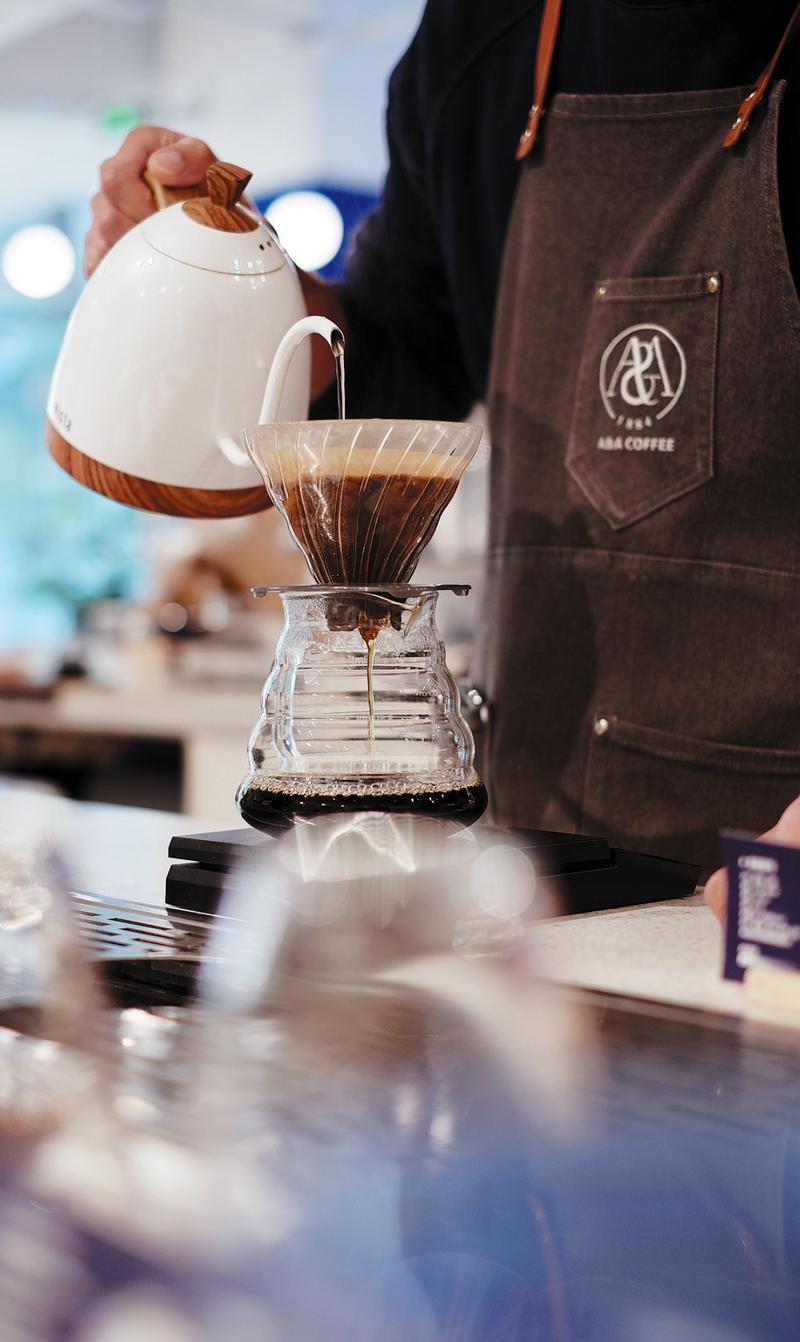The meteoric rise in the number of specialty cafes in Shanghai shows that Chinese consumers aren't just drinking more coffee-they are becoming more sophisticated as well, He Qi reports in Shanghai.
 (PHOTO PROVIDED TO CHINA DAILY)
(PHOTO PROVIDED TO CHINA DAILY)
When A&A Coffee opened in Shanghai in 2017, the specialty-coffee joint could only sell about 10 cups of coffee a day.
Today, the cafe sells an average of 100 cups during weekdays and 150 cups on weekends, and this can be attributed to the burgeoning coffee culture in China, says the co-founder of A&A Coffee, Lyu Manxuan.
The fact that customers in their 60s and 70s patronize the cafe every morning is also an indication that coffee consumption has become widely accepted by the general society and not just those from the younger generation, says Lyu.
People know much more about coffee now. In the past, customers patronized coffee places mainly for the ambience and would order only cappuccinos or lattes. Now, many customers understand the differences between coffee beans and are clearly more aware of what suits them
Lyu Manxuan, co-founder of A&A Coffee
"People know much more about coffee now. In the past, customers patronized coffee places mainly for the ambience and would order only cappuccinos or lattes," says the 26-year-old.
"Now, many customers understand the differences between coffee beans and are clearly more aware of what suits them."
According to CIConsulting, a leading industry-research firm, China's coffee consumption will grow by 15 percent to 20 percent per year between 2017 and 2021.
In a report that analyzed the Chinese coffee market, CIConsulting predicted that the per capita coffee consumption in the nation would increase from 6.2 cups in 2018 to 10.8 cups in 2023, with the market size growing threefold from 56.9 billion yuan to 180.6 billion yuan (US$8 billion-US$25.58 billion).
Shanghai has without doubt been the epicenter of this boom in coffee consumption, with Lyu citing such factors as the cosmopolitan nature of the city, the growing affluence of its citizens and the fast-rising levels of awareness of coffee.
Indeed, the number of specialty-coffee shops in Shanghai currently stands at around 8,000, up from 4,000 in 2015, according to the Shanghai Chain Enterprise Association.
Though business has been brisk, Lyu admits that selling specialty coffee is still "not very profitable". The main reasons behind this are the high rental rates in Shanghai and the growing competition.
"Small independent stores like us cannot invest much in marketing and promotion like the major coffee chains. This means that our reach is limited," she says.
 Co-founder of A&A Coffee Lyu Manxuan sees her business grow because of the burgeoning coffee culture in China. (PHOTO PROVIDED TO CHINA DAILY)
Co-founder of A&A Coffee Lyu Manxuan sees her business grow because of the burgeoning coffee culture in China. (PHOTO PROVIDED TO CHINA DAILY)
Despite the low profits, Lyu says that she is determined to stay in this industry simply because of her love for coffee.
"There are many coffee shop owners in Shanghai who used to be lawyers, doctors and elites in their respective industries. But all of them have been willing to make sacrifices to pursue their love of coffee," she says.
Another coffee outlet that has been reaping the benefits of the coffee boom is Par Cafe, which is a part of Family Mart, a Japanese convenience store operator.
According to Wang Yongyi, marketing director of Family Mart on the Chinese mainland, the sales of Par Cafe have doubled every year since 2014. Last year, the cafe sold around 100 million cups on the Chinese mainland, a fivefold increase from 2017.
The number of Family Mart outlets which come with a Par Cafe on the Chinese mainland has also grown from 2,000 in 2018 to 2,700 in 2019. Shanghai is home to 1,500 of these stores.
"We will expand the coffee-experience areas in Family Mart, and our final goal is to launch our coffee brand independently," Wang says.
"We want to do more than just expand our market presence-we also aim to help raise the level of awareness of coffee, allowing more people to understand this culture, what high-quality coffee is and the ingredients that go into making coffee."
Despite the growing competition, Lyu is confident that there is still more room for new players to cater to different segments of the market.
She explains that while coffee chains like Starbucks focus more on providing a comfortable in-store environment, those like Par Cafe are primarily aimed at white-collar workers who simply need a quick caffeine fix. Specialty cafes, on the other hand, meet the demands of the more discerning customer.
 A barista makes coffee at A&A Coffee in Shanghai. (PHOTO PROVIDED TO CHINA DAILY)
A barista makes coffee at A&A Coffee in Shanghai. (PHOTO PROVIDED TO CHINA DAILY)
The relatively low consumption rate is another factor that industry players can cheer about.
"Compared with foreign coffee markets, the average person in China only drinks three to four cups of coffee every year," says Lyu.
In contrast, the average American drinks some 400 cups per year. Coffee drinkers in Scandinavian nations like Norway and Sweden drink more than 1,000 annually.
"We don't really have much competition in such a potentially large market. We should welcome more cafes of different styles to let more people understand and enjoy the coffee culture," she adds.
Although the epidemic has hit the freshly brewed coffee market-Starbucks, for instance, temporarily closed over half of its outlets in China in late January-the overall coffee market is still growing, especially the instant-and drip-coffee segments, says Wang.
He notes that the increasing pace of life has compelled many consumers who are strapped for time to pick these convenient kinds of coffee instead.
According to the Research Institute of China for Business Industry, instant coffee accounts for 70 percent of the market share while freshly brewed coffee only makes up 15 to 20 percent.
"The entire coffee industry will pay more and more attention to these peripheral products as coffee is gradually becoming a necessity in life. Besides, these products are not only convenient but also allow people to minimize contact with others during an epidemic," Wang says.
Contact the writer at heqi@chinadaily.com.cn


